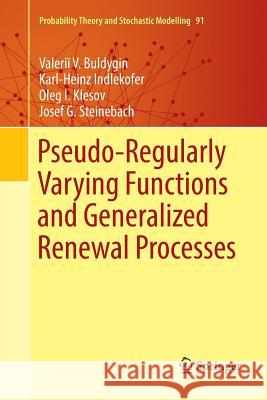Pseudo-Regularly Varying Functions and Generalized Renewal Processes » książka
topmenu
Pseudo-Regularly Varying Functions and Generalized Renewal Processes
ISBN-13: 9783030076061 / Angielski / Miękka / 2019 / 482 str.
Kategorie:
Kategorie BISAC:
Wydawca:
Springer
Seria wydawnicza:
Język:
Angielski
ISBN-13:
9783030076061
Rok wydania:
2019
Wydanie:
Softcover Repri
Numer serii:
000712318
Ilość stron:
482
Waga:
0.70 kg
Wymiary:
23.39 x 15.6 x 2.59
Oprawa:
Miękka
Wolumenów:
01











